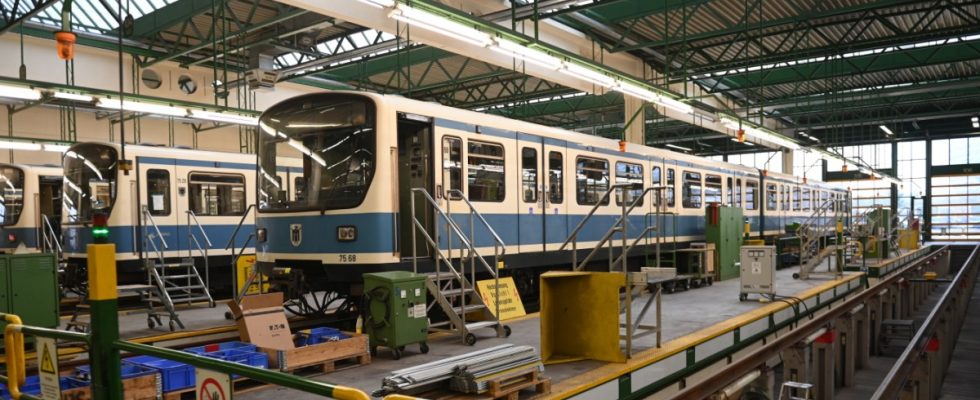For months, passengers have been complaining about broken subways and having to squeeze into short trains on various lines. The Munich Transport Company (MVG) currently has a problem that it is only slowly getting under control: On the one hand, it lacks vehicles and, on the other hand, it lacks sufficient staff for maintenance, as MVG boss Ingo Wortmann and Oliver Glaser, rail operations manager, said on Tuesday in the U- Fröttmaning railway depot explained. In addition, there is an outdated infrastructure in the workshop. Fire protection on trains is also causing a lot of trouble.
The MVG measures its fleet strength in so-called double railcars. Two of them coupled together form a short train and three form a long train, which also corresponds to the more modern C-cars. The fleet currently consists of a total of 356 such double multiple units, but only 241 of them are available for operation. In order to fulfill the performance program, there should actually be 272. Passengers notice this deficiency particularly on the U7 and U1 lines, which currently only run as a short version. The MVG has restricted the offer for U3 and U4.
According to MVG, there are many factors that are to blame for the shortage of vehicles: Older B and C1 series subways, in use since 1987 and 2002 respectively, currently need to be equipped with new fire protection systems. Wagner Rail is carrying out the conversion of the B-cars. But in the recent past, some of the trains came back to the Fröttmaning workshop with more than 100 defects, where they then had to be extensively reworked. The error rate has now improved after intensive discussions with the manufacturer; according to Glaser, it is currently less than ten per move.
According to Glaser, there is a reason why MVG doesn’t simply change suppliers: converting old vehicles isn’t exactly easy, and not many companies are able to do it. This is an art, he says.
Then all passengers must get off at the next stop
On the brand new C2 trains, which have been running in Munich since 2016, the fire protection that has already been installed is so susceptible to failure that around two vehicles break down every day. If an error message is reported in the fire system, a train must be taken out of service. Often it would be enough to restart the system. But the driving staff cannot do a reset themselves, they can only report the error to the control center. Then all passengers have to get off at the next stop, the train is first taken to the next turning point and then to Fröttmaning in the evening.
A simple reset could fix 70 percent of errors, says Glaser. That’s why the field service is now being trained so that it can also do this at turning systems.
MVG boss Ingo Wortmann (left) and Oliver Glaser, head of rail operations, are trying to get the problems under control.
(Photo: Stephan Rumpf)
Malfunctions in safety technology are not the only problem with the latest generation of trains. As it recently emerged, the adhesive joints on the head carriages of the C2 vehicles are faulty and need to be repaired.
Wortmann calls this a “blatant poor performance by the industry.” “Many suppliers have no idea that these subway cars are used in their operations.” Sometimes it is said that you can get the car back by the end of the year, “but we can’t wait that long.” He could only apologize to the passengers, says Wortmann. “It is not our company’s requirement to work in this form.”
According to Wortmann, the very old A trains have reached their “rusty end” after up to 50 years and are no longer being converted. They are scheduled to be phased out by 2025. However, no A wagons are currently being scrapped because they are still needed due to the current vehicle shortage.
115 cars are currently not in use due to conversion or maintenance. Flattened tires that no longer run smoothly are also a problem. To remedy this, the MVG itself only has outdated machines, which is why some of the bogies to which the wheels are attached have to be sent to Nuremberg for repairs.
The MVG hopes that it will be able to put the new subway depot in Neuperlach Süd into operation in the 2030s, against which there is currently great resistance from the population. But the new farm is urgently needed, as Wortmann and Glaser emphasize. The old hall in Fröttmaning is simply too small for the modern C-cars, which have to be laboriously dismantled for repairs. “This is a waste of working time,” says Glaser.
In addition, there are currently around 15 employees missing from the Fröttmaning workshop. All of this is delaying the repairs – even though, according to Glaser, there is an “incredible summer” ahead with the European Football Championship and lots of concerts. After that, the Oktoberfest is coming up, says Glaser. “We need the vehicles to be fully functional.”

